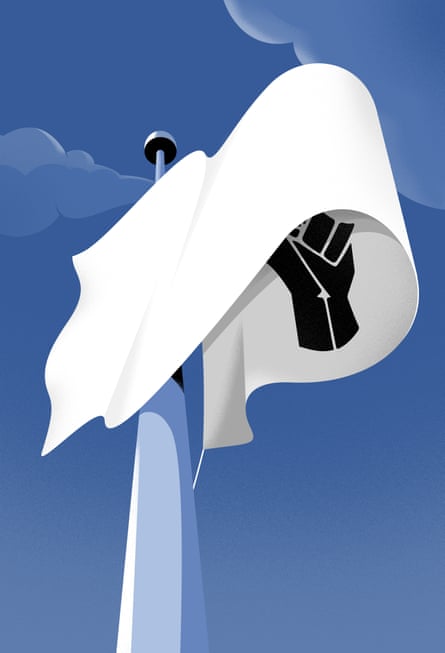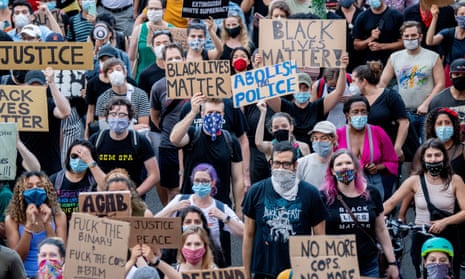In 2018, two other novelists and I were being driven back from a reception in Grosse Pointe, Michigan, to our hotel in downtown Detroit, when we saw a black man getting arrested on the side of the road. The driver of our car, a white woman who had spent the earlier part of the drive ranting about how Coleman Young, Detroit’s first black mayor, had ruined the city, looked at the lone black man surrounded by police officers with their guns drawn and said: “It’s good they’ve got so many on him. You never know what they’ll do.”
Two years before, I had published my first novel, Homegoing, a book that is, among other things, about the afterlife of the transatlantic slave trade. The book thrust me into a kind of recognition that is uncommon to fiction writers. I was on late-night shows and photographed for fashion magazines. I did countless interviews, very little writing. The bulk of my work life was spent touring the country giving various readings and lectures. I spent about 180 days of 2017 either at an event, or travelling to or from one. By the time that car ride in Michigan came around, I was exhausted, not just by the travel but by something that is more difficult to articulate – the dissonance of the black spotlight, of being revered in one way and reviled in another, a revulsion that makes clear the hollowness of the reverence.
The next morning, I delivered my address to a room full of people who had gathered for a library fundraiser, an address where I insisted, as so many black writers, artists and academics have before me, that America has failed to contend with the legacy of slavery. This failure is evident all around us, from our prisons to our schools, our healthcare, our food and waterways. I gave my lecture. I accepted the applause and the thanks, and then I got into another car. It was a different driver, but it was the same world.
I was thinking about that driver’s words again last summer as news poured in about the killings of George Floyd, Ahmaud Arbery and Breonna Taylor. I was thinking about the way in which white people, in order to justify their own grotesque violence, so often engage in a kind of fiction, an utterly insidious denialism that creates the reality it claims to protest. By which I mean an unwillingness to see the violence that is actually happening before you because of a presumption of violence that might happen, is itself a kind of violence. What exactly can a man with a knee on his neck do, what can a sleeping woman do to deserve their own murder? To make room for that grotesqueness, that depraved thinking, to believe in any murder’s necessity, you must abandon reality. To see a man with several guns aimed at him, his hands on his head, as the problem, you must leave the present tense (“It’s good they’ve got so many on him”) and enter the future (“You never know what they will do”). A future, which is, of course, entirely imagined.
I make my living off my imagination, but this summer, as I watched Homegoing climb back up the New York Times bestseller list in response to its appearance on anti-racist reading lists, I saw again, with no small amount of bile, that I make my living off the articulation of pain too. My own, my people’s. It is wrenching to know that the occasion for the renewed interest in your work is the murders of black people and the subsequent “listening and learning” of white people. I’d rather not know this feeling of experiencing career highs as you are flooded with a grief so old and worn that it seems unearthed, a fossil of other old and worn griefs.
When an interviewer asks me what it’s like to see Homegoing on the bestseller list again, I say something short and vacuous like “it’s bittersweet”, because the idea of elaborating exhausts and offends me. What I should say is: why are we back here? Why am I being asked questions that James Baldwin answered in the 1960s, that Toni Morrison answered in the 80s? I read Morrison’s The Bluest Eye for the first time when I was a teenager, and it was so crystalline, so beautifully and perfectly formed that it filled me with something close to terror. I couldn’t fathom it. I couldn’t fathom how a novel could pierce right through the heart of me and find the inarticulable wound. I learned absolutely nothing, but some minor adjustment was made within me, some imperceptible shift that occurs only when I encounter wonder and awe, the best art.
To see my book on any list with that one should have, in a better world, filled me with uncomplicated pride, but instead I felt deflated. While I do devoutly believe in the power of literature to challenge, to deepen, to change, I also know that buying books by black authors is but a theoretical, grievously belated and utterly impoverished response to centuries of physical and emotional harm. The Bluest Eye was published 51 years ago. As Lauren Michelle Jackson wrote in her excellent Vulture essay “What is an anti-racist reading list for”, someone at some point has to get down to the business of reading.
And it’s this question of “the business of reading”, of how we read, why we read, and what reading does for and to us, that I keep turning over in my mind. Years ago, I was at a festival with a friend, another black author, and we were trading stories. She said that the first time she did a panel with a white male author she was shocked to hear the questions he was asked. Craft questions. Character questions. Research questions. Questions about the novel itself, about the quality and the content of the pages themselves. I knew exactly what she meant.

So many of the writers of colour that I know have had white people treat their work as though it were a kind of medicine. Something they have to swallow in order to improve their condition, but they don’t really want it, they don’t really enjoy it, and if they’re being totally honest, they don’t actually even take the medicine half the time. They just buy it and leave it on the shelf. What pleasure, what deepening, could there be in “reading” like that? To enter the world of fiction with such a tainted mission is to doom the novel or short story to fail you on its most essential levels.
I’ve published two books during particularly fraught election years and the general tenor of many of the Q&A sessions has been one I would describe as a frenzied search for answers or absolution. There’s so much slippage between “please tell me what I’m doing wrong” and “please tell me that I’ve done nothing wrong”. The suddenness and intensity of the desperation to be seen as being “good” run completely counter to how deeply entrenched, how very old the problems are. There is a reason that Homegoing covers 300 years, and even that was only but the shallowest dip into a bottomless pool. A summer of reading cannot fix this. Some may want to call the events of June 2020 a “racial reckoning”, but in a country in which there was a civil war and a civil rights movement 100 years apart, at some point it would be useful to ask how long a reckoning need take. When, if ever, will we have reckoned?
And so where does all the “listening and learning” leave us exactly? In the early days of summer, as my dog barked at the protesters who flooded the streets outside my building, I tried to decide whether I wanted to join. When I finally did, I felt a million things all at once: moved and proud and hopeful and enraged and offended and hopeless. There was something legitimately beautiful about being in a multiracial, multigenerational, multiclass body of people who for months filled the streets, shouted and marched and defied.
And yet. To see white people holding up Black Lives Matter signs as we marched through a gentrified Brooklyn. To see white parents hoisting children up on their shoulders, chanting Black Lives Matter, when I suspect they’ve done as much as possible to ensure those same children never have to go to school with more than a tasteful smattering of black children. All of it brings up the dissonance again. The revulsion that makes clear the hollowness of the reverence. Black Lives Matter – a reverent, simple, true phrase – can only be hollow in the mouths of those who cannot stomach black life, real life, when they see it at a school, at the doctor’s office, on the side of the road. Still, I marched. A few months later, I went back on tour for my second novel, knowing what I have always known. The world can change and stay exactly the same.
